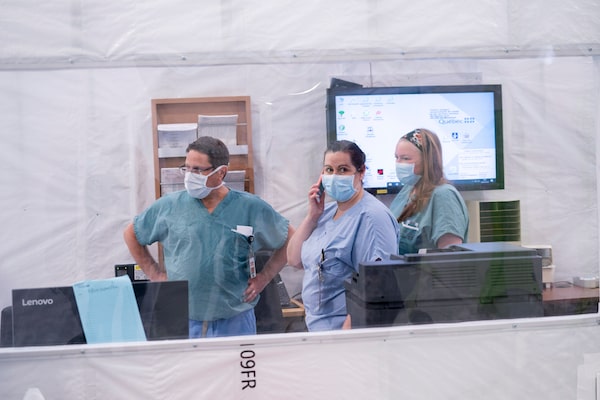
Health care workers at the nursing station in Verdun Hospital in Montreal.Paul Chiasson/The Canadian Press
Faced with the prospect of losing tens of thousands of health care workers from an already overstretched system in the middle of a pandemic, Quebec didn’t really have a choice: it had to postpone its mandatory vaccination deadline.
It is tempting to lambast the provincial government for caving under pressure, and for inadvertently undermining vaccine mandates set to be implemented in other provinces. Some will insist that the pain that would have been inflicted on the system by suspending almost 22,000 workers would have been worth the message it would drive home about the moral imperative of vaccination, particularly among those who work with the most vulnerable. But the poignancy of that message would’ve quickly been eclipsed by the catastrophic effects on the health care system.
The system is barely functioning as it is. The province is short about 4,300 nurses and one Montreal hospital has cancelled non-urgent surgeries. There remains an enormous backlog of patients waiting for surgeries and Quebec’s largest nurses union instructed its members to refuse mandatory overtime this past weekend.
Premier François Legault has tried to address staffing shortages by offering full-time nurses bonuses of up to $18,000, but chronic problems – such as staff burnout and the feeling among nurses that they are being taken for granted – have meant that many full-time positions remain unfilled. There was no way Quebec, through its vaccine mandate, could have pushed thousands more out the door.
Politicians who recently travelled now have a message for Canadians: Don’t travel
Is a third COVID-19 shot the charm?
There is certainly risk in continuing to allow unvaccinated staff to remain in health care. But that risk has to be measured against the dangers of operating a critically understaffed system. In the former scenario, where unvaccinated employees continue to work, the concern is that staff who are not vaccinated might contract COVID-19, and they might transmit the virus to patients who are ill or immunocompromised. However, there are ways to mitigate that risk, by, for example, requiring unvaccinated staff to perform daily rapid tests, or if possible, reassigning them to work with patients without immune deficiencies.
But in a scenario where unvaccinated workers are suspended without pay, there are no “mights” or “maybes.” The critically understaffed system will be put under additional strain and the effect will be universal; staff shortages will have consequences for every single patient requiring health care services, as opposed to the sporadic effect – though still very serious – that unvaccinated employees might have on the patients with whom they come in contact.
There will be further cancelled surgeries, possibly even closed wards or health care facilities, and the ripple effect on already overworked nurses could be cataclysmic: nurses who have been barely hanging on, facing an increased workload, may simply walk out the door behind those who are suspended and never come back, even after the pandemic is over. A strong message about vaccination is important, but not important enough to sacrifice the province’s health care system.
Vaccine mandates have been extraordinarily successful outside of Quebec’s health care system. It’s the reason why United Airlines boasts a 99.5 per cent vaccination rate among its employees. Tyson Foods boosted its vaccination rate from less than 50 per cent to more than 90 per cent in two months after it announced it would require COVID-19 vaccines for its U.S. workforce (it also offered a $200 incentive). The threat of losing one’s job has indeed proved to be a powerful incentive to get vaccinated, and so too has the prospect of losing access to social spaces.
But the effect of a vaccine mandate on Quebec’s health care workers has still not been as pronounced as it needs to be. There could be a few reasons for that, including the strong sense of solidarity among unionized workers, and the fact that the impetus to get vaccinated for the sake of one’s job is less motivating than it might be when nurses are a few mandatory overtime shifts away from quitting anyway. What’s more, United Airlines could’ve found a way to function should it have had to put four per cent of its workforce on unpaid leave, but Quebec’s health care system cannot – not without compromising patient access and safety, anyway.
Unvaccinated health care workers in Quebec knew they had that leverage, which is why they could call the government’s bluff. And Mr. Legault, stuck between two undesirable outcomes, had to opt for the less universally damaging one. It’s a win for unvaccinated staffers, but better than a loss for absolutely everyone in Quebec.
Keep your Opinions sharp and informed. Get the Opinion newsletter. Sign up today.